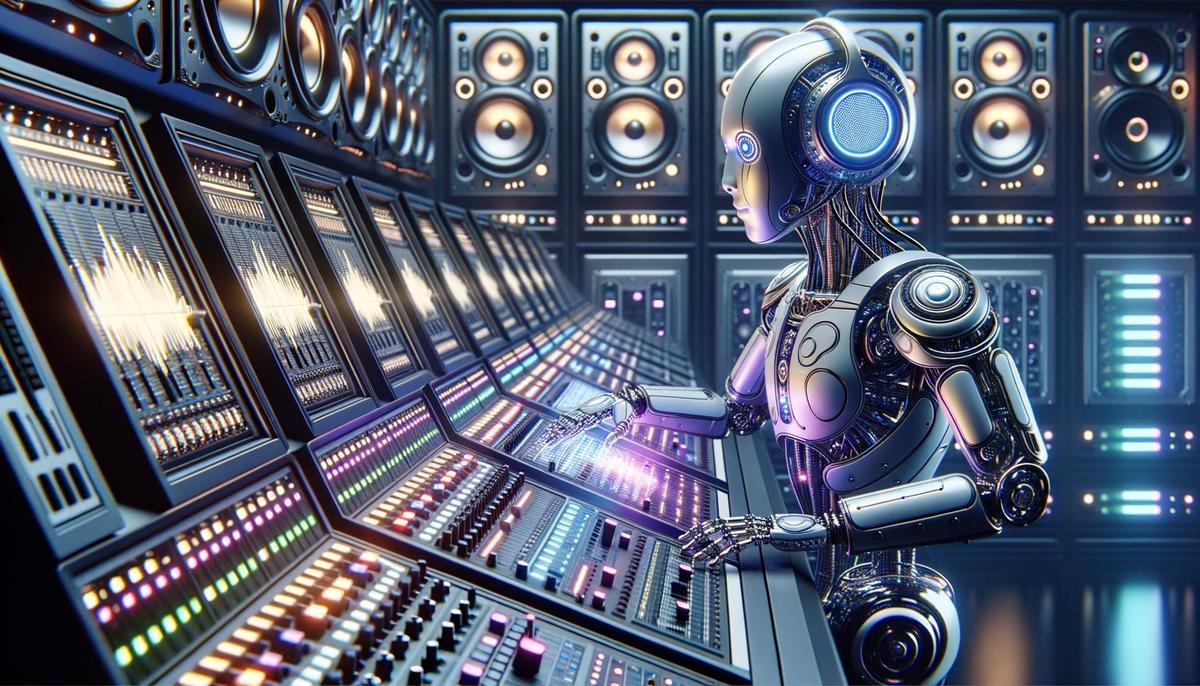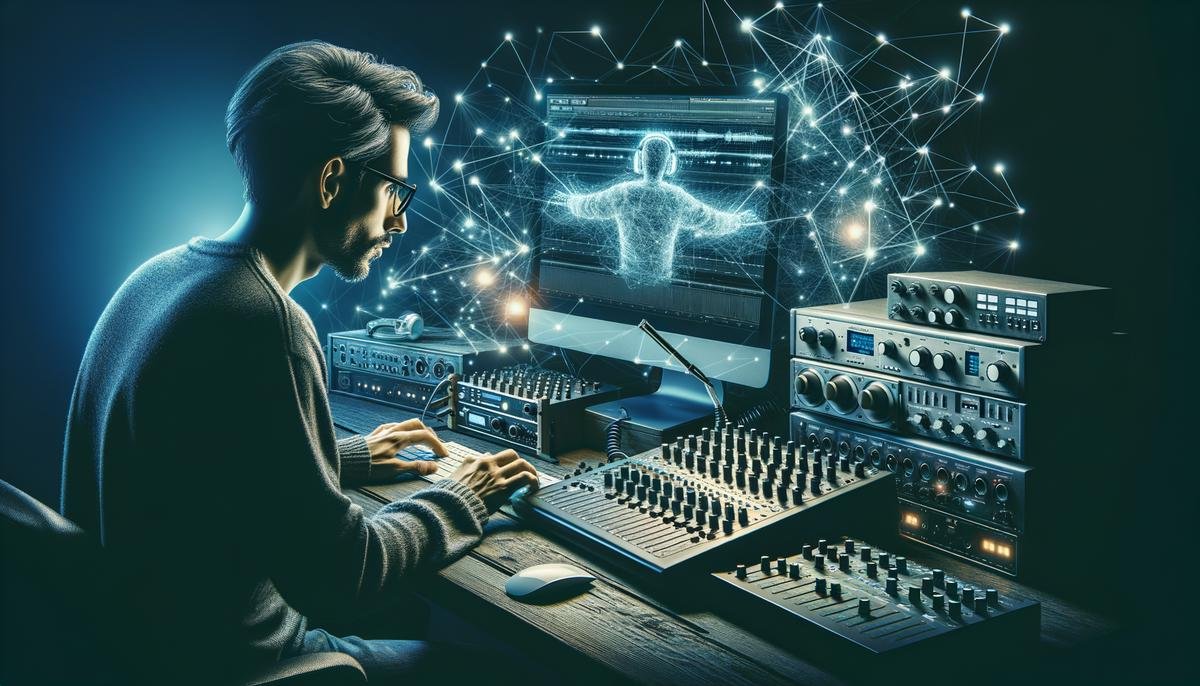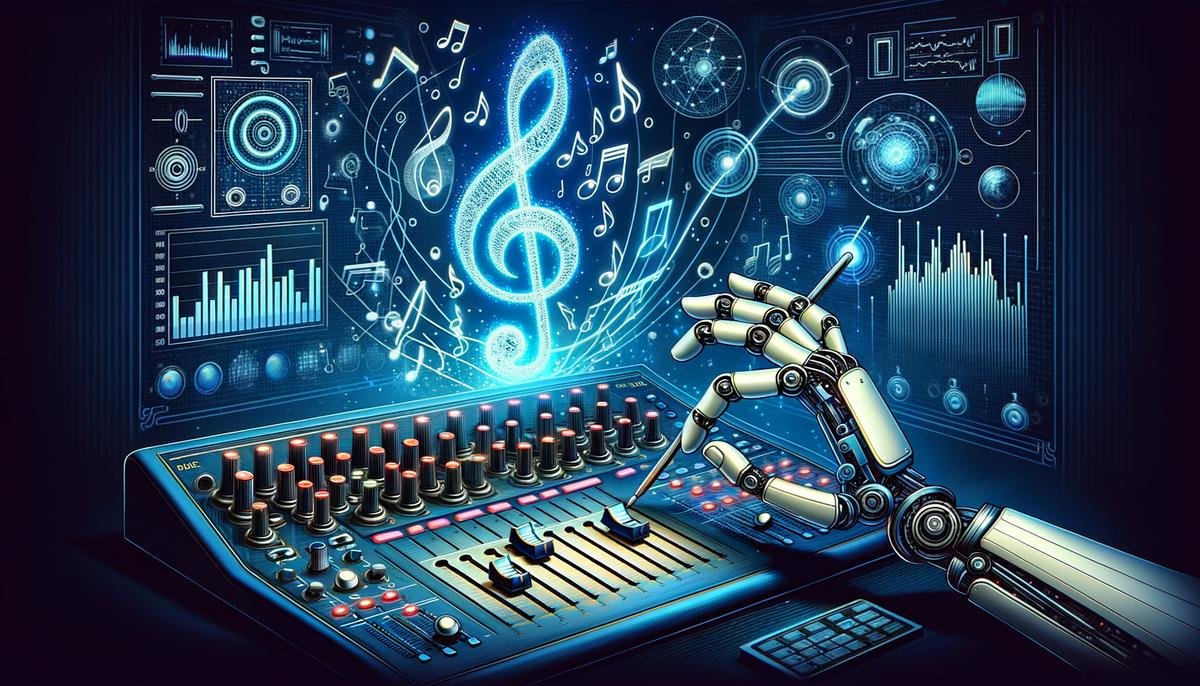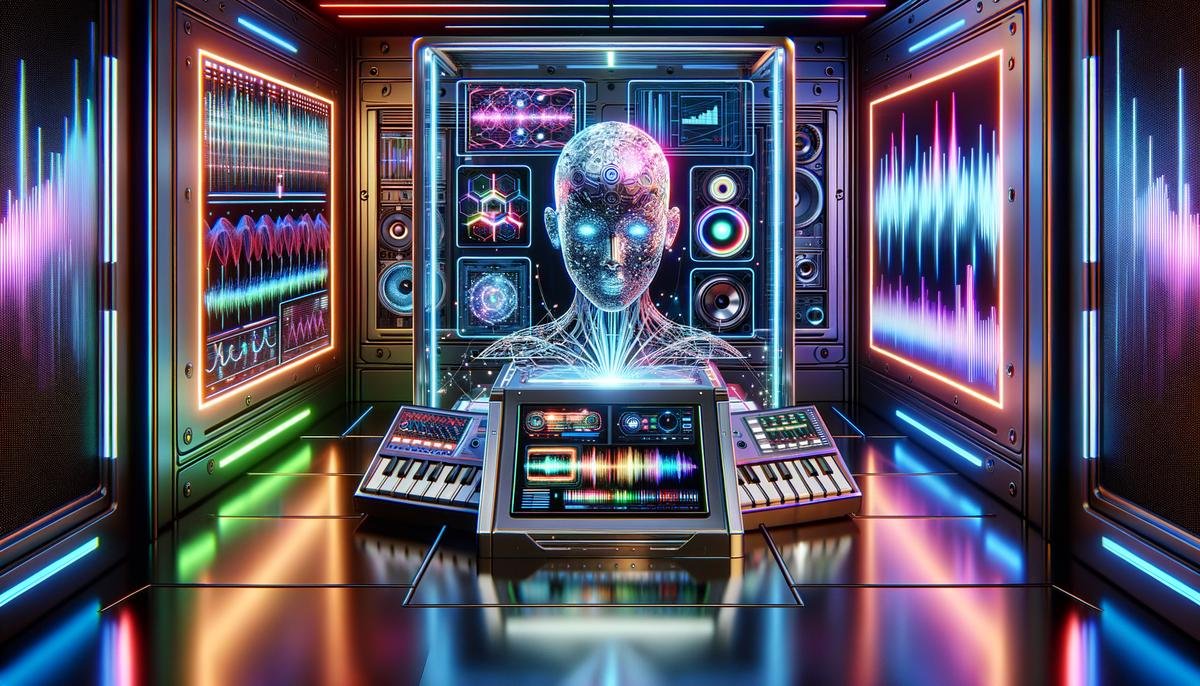Imagine a recording studio where a virtual engineer works tirelessly, mastering tracks with precision that rivals human expertise. This isn’t science fiction — it’s the reality of AI mastering in music production today. At the heart of this revolution is software like Landr, powered by algorithms and machine learning, which can fine-tune music to sound its best. This essay embarks on a journey through the technology of AI mastering, detailing the intricate processes that empower Landr to perform its audio magic.
The Fundamentals of AI Mastering
AI Transforms Mastering in Music Production
Mastering music is a crucial final step in production, where the audio is polished to perfection before hitting the airwaves. Now, artificial intelligence is revolutionizing this art, making leaps and strides that change how producers finalize their tracks. AI-driven mastering services are shaking up the industry with speed, efficiency, and cost-effectiveness.
With AI mastering, algorithms analyze a song, comparing its sonic elements to vast catalogs of professional tracks. This smart tech zeroes in on ideal sound profiles and applies precise adjustments, from equalization to compression. It’s a game-changer — artists feed their tunes to the software, and in minutes, it’s mastered to industry standards.
These AI tools don’t just replicate generic settings; they’re learning machines, adapting and evolving. They pick up on subtle nuances and styles, tailoring their output to the distinct flavor of each piece. For musicians short on resources but rich in creativity, AI mastering is the key to competing with big-budget productions without breaking the bank.
Collaboration between human and machine is also on the rise. Producers can guide AI with their expertise, merging the technical skill of a seasoned audio engineer with algorithmic precision. This synergy creates a product that sounds meticulously human-crafted, yet it’s completed with the efficiency only technology can provide.
Moreover, AI mastering isn’t just about making songs radio-ready. It’s about accessibility — empowering DIY artists and smaller studios to achieve top-tier sound. Now, anyone with a dream and a digital workstation has a shot at a professionally mastered track.
As AI continues to innovate, mastering is becoming more than just a technical necessity. It’s becoming a transformative step in the creative process, accessible to all, and reshaping music production as we know it. With every song it touches, AI mastering is not just fine-tuning audio; it’s tuning up the future of music itself.

Landr’s AI Mastering Features
Landr’s AI mastering service stands out in the music industry as a tech-forward way for producers to polish their tracks. The service leverages advanced algorithms, honed by years of data and user feedback, to deliver a quality that rivals professional studio sessions. At the heart of Landr’s prowess is its ability to assess the genre, style, and production elements of a song, offering bespoke mastering solutions tailored to the track’s unique character.
One of the platform’s advanced offerings is the ‘Style Dial.’ Think of it as a mood ring for music – it analyzes the vibe you’re going for, whether it’s a warm vintage feel or a punchy contemporary sound. Producers can nudge the dial toward one of these tonal palettes, and Landr’s AI gets to work, infusing the track with the desired atmosphere.
Then there’s the ‘Loudness Control.’ With streaming platforms enforcing standardized loudness levels, achieving optimal loudness without sacrificing dynamics is a delicate balancing act. Landr’s AI navigates this with aplomb, optimizing tracks for streaming compliance while maintaining the integrity of the music’s dynamics.
For those who crave control, Landr offers an ‘Intensity’ feature. This allows producers to dictate how much the AI should intervene, from subtle enhancement to aggressive treatment. Just how heavy-handed the AI gets can be the difference between a track that whispers in the background and one that roars on the dance floor.
Adding to this sophistication is the ‘Reference Track’ feature. Producers can feed Landr a track they admire, and the AI will take cues, emulating tonal qualities and mastering fingerprints to bring a similar sonic essence to the table. This is a powerful tool for producers aiming to benchmark their sound against industry-leading tracks.
Moreover, the integration of ‘Metadata Editing’ into the mastering process simplifies what was once a tedious post-mastering step. Landr allows users to directly input track information like titles, artist names, and genres, which is then seamlessly baked into the final master, streamlining the journey from creation to distribution.
The cherry on top is Landr’s ‘Revision’ capability, showing that the AI is an attentive listener. If the master doesn’t hit all the right notes, producers can provide feedback, and the AI adjusts accordingly, learning and refining its approach for the next round.
Landr’s AI mastering service distills complex sound science into a tool that’s powerful yet user-friendly, showcasing state-of-the-art features that empower producers to realize their vision with unprecedented ease. Such advancements suggest a future where the artistic and technical sides of music production continue to converge, enabling creativity to flow unimpeded by technical constraints.

Quality Comparison and Professional Feedback
In the burgeoning world of digital music production, the name Landr resonates with innovation, particularly in the arena of AI mastering. Landr’s foray into artificial intelligence applies a significant shift in the mastering landscape, challenging the traditional role of human professionals in this intricate task. But how does the quality of Landr’s AI mastering stack up against the keen ears and seasoned judgment of human mastering engineers?
To understand this comparison, one must look beyond the basics of what mastering entails—creating a cohesive listening experience, leveling track volumes, and ensuring compatibility across various playback systems. When human professionals master a track, they apply years of experience and subtle auditory nuances that AI has yet to replicate fully. These sound wizards consider the emotional intent behind a piece of music, applying an artisan’s touch to each track. Their expertise enables them to make nuanced decisions that might escape even the most sophisticated algorithms.
Landr’s AI, by contrast, is no mere novice. It embodies the cutting-edge blend of technology and music, bringing data-driven precision to the mastering process. By analyzing millions of songs, Landr’s AI has fine-tuned its ability to make sharp adjustments and deliver quality sound. Its sophisticated algorithms can judge a song’s genre and stylistic elements, making educated decisions on EQ settings, compression, and stereo imaging. Yet, some might argue that the AI cannot appreciate the full context of a song, the backstory, or the emotional undertones that might influence a human engineer’s fine-tuning.
Still, Landr’s suite of features is formidable. The ‘Style Dial’ allows artists to guide the AI toward their desired sonic character, while ‘Loudness Control’ ensures tracks meet industry standards for streaming services—a technical nuance crucial in the digital age. Furthermore, the ‘Intensity’ feature hands back a measure of control to the user, dictating the level of AI engagement in the mastering process. Musicians can even wield the ‘Reference Track’ tool to compare their sound to exemplary pieces, striving for competitive quality.
However, the question persists: can these features grasp the full breadth of human creativity or the depth of subtle sonic layers that a professional engineer might reveal within a track? While AI infuses efficiency and cost-effectiveness into the equation, it is the discerning ear of the music connoisseur that often identifies the subtle echelons of audio perfection. Human mastery in sound mastering often hinges on imperceptible details that incite emotional responses—a feat that AI is yet to conquer unequivocally.
In sum, Landr’s AI mastering service stands as a testament to technological advancement in music production. For aspiring artists and veterans alike, the trade-off between instantaneity and the bespoke craftsmanship of a human professional remains a debate. Though the gap is narrowing, with AI becoming increasingly adept, certain nuances in sound may still elude the synthetic grasp. Yet, for many in the industry, Landr has ushered in an era of unprecedented accessibility and opportunity, painting a future where the lines between what is created by man and machine are ever more blurred.

The Impact of AI Mastering on the Music Industry
AI Mastering and the Changing Music Industry Landscape
Artificial intelligence has not just entered the music production arena; it’s reshaping it. Services like Landr are carving a new path for artists and producers, presenting a shift that’s felt across the entire landscape of music creation. The promise of AI mastering is not just about delivering polished tracks—it’s about redefining what it means to produce music.
One of the profound shifts caused by AI mastering tools is the democratization of high-quality sound. With barriers to professional mastering reduced, the music industry is witnessing an influx of diverse voices. Artists who may never have had the means to afford traditional mastering now have access to services that can propel their music to industry standards. This shift is fostering a more inclusive and varied musical ecosystem.
The influence of AI extends into the realm of innovation within music genres. As Landr and similar services fine-tune their algorithms, the resulting mastered tracks are subtly influencing the sonic signatures of entire genres. What once was a subjective pursuit of the ‘perfect sound’ could now become standardized, with AI consistently delivering within defined parameters.
Furthermore, the availability of AI mastering is altering the dynamics between producers and mastering engineers. The traditional gatekeeping of the music industry may see a decline as artists take more control over the end-to-end production process. This power shift could lead to more experimental sounds as artists explore mastering nuances themselves, rather than deferring to established industry norms.
Yet, it’s not just about the artists. Listeners, too, are part of this transformation. With the quality of production becoming more consistent, audience expectations may evolve. Consumers of music will have access to a wider range of professionally polished tracks, potentially changing consumption patterns and influencing charts and streaming algorithms.
Even the commercial aspects of music production are affected. Record labels could see their roles transform, as the need for substantial investment in production resources diminishes. A&R strategies might shift toward discovering artists who are not only talented but also adept at leveraging AI mastering to its full potential.
In tandem with the technological advancements, there’s a conversation about the value of human touch in music production. AI mastering is not without its critics, who argue that the subtleties of emotional intelligence and the intuitive understanding of a human mastering engineer cannot be replicated. This ongoing dialogue highlights the tension between efficiency and the intangible qualities of human creativity.
In the mix are music education and vocational training. Aspiring producers and sound engineers may find curriculums evolving to include AI mastery literacy. This change could usher in a new cohort of professionals adept at both traditional techniques and cutting-edge technology, equipped to navigate the music industry’s future landscape.
Lastly, the step into AI mastering marks a significant pivot point for music technology as a whole. It prompts questions on how technology might further advance and what new tools might emerge—the possibilities expand beyond our current frame of reference. As AI mastering becomes more sophisticated and ubiquitous, the question of human versus machine in music production persists, stirring both excitement and unease within the industry.
Indeed, the ripples caused by AI mastering services like Landr traverse beyond just a more polished sound—they are redefining the entire canvas of music production. As creators and consumers of this art form, we are on the cusp of a new era, one in which the harmony of code and chord charts a fresh narrative in the symphony of music creation.

Navigating the Ethical Considerations
Understanding the Ethical Implications of AI Mastering in Music
The advent of AI-based mastering services like Landr in the music industry has opened a Pandora’s box of ethical considerations that ripple through the fabric of audio production. At its core, this tech-driven shift grapples with the virtues and vices of relegating creative control to algorithms—a choice that’s reshaping the soundscapes and cultural norms of our times.
As artists lean into AI to polish their tracks, the authenticity of music comes under scrutiny. What are the ethical implications of yielding portions of the creative process, traditionally steeped in human emotion and expertise, to the calculated precision of machines? This pivotal question dances at the heart of the debate surrounding AI mastering.
Certainly, the efficiency and affordability of AI mastering platforms democratize music production. Yet, this democratization casts a long shadow over the profession of mastering engineers—crystallizing concerns about job displacement. While no one can dispute the empowerment of musicians forging their work with AI tools, a parallel narrative raises alarms about the erosion of specialized trades that have defined music production for decades.
The potential for homogenization of sound further amplifies ethical alarms. AI, for all its advances, operates on patterns and data aggregates, potentially narrowing the auditory palette into uniformity. If AI mastering defaults to certain ‘successful’ templates, are we at risk of losing the unique, sometimes unorthodox, flourishes that human engineers might champion?
Moreover, the opacity of AI decision-making introduces ethical tension. If the criteria and reasoning behind specific tweaks and alterations are concealed within the AI’s ‘black box’, artists surrender a degree of control and insight into the final touch of their creation. This enigma challenges the very essence of creativity, where understanding the ‘why’ behind choices is often as critical as the choices themselves.
Consider also the cultural significance of music shaped by the diverse hands of human masters, who bring not only their technical skills but also their life experiences to bear on a piece. An ethical question emerges in evaluating whether AI, devoid of cultural context, might inadvertently flatten the rich texture of cultural expression found in music—a treasure that reflects humanity’s myriad voices.
As we embrace the slick, streamlined future promised by AI mastering services, it’s essential to navigate these ethical concerns with mindfulness and foresight. Engaging in robust conversations, setting industry standards, and promoting transparency can help ensure AI serves as a tool that enhances, rather than undermines, the artistry and integrity of music production.
The nuances of AI and its sweeping influence on the music industry attest to the fact that while machines are learning to master tracks, we must master an understanding of the ethical chords they strike in the symphony of music production.

The music industry stands at the threshold of a new era, one where AI like Landr challenges the traditional landscape of music production. This shift raises questions that resonate beyond the soundwaves, touching on the very essence of creativity and the future of human and machine collaboration in the arts. As we reflect on the evolving soundscape, it’s clear that AI mastering isn’t just about the notes and the silence in between — it’s about the harmony of innovation and tradition that shapes the music of tomorrow.



